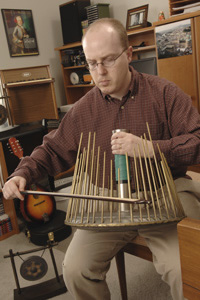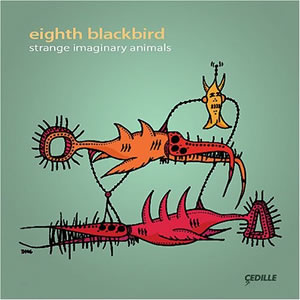Doctoral studentís piece recorded on ensembleís Grammy-winning album
By Josh SchonwaldNews Office
 David Gordon, a Ph.D. student in Music, plays a waterphone in his home studio. Gordon’s composition, Friction Systems, had been chosen by members of the University’s resident-ensemble eighth blackbird to not only be performed live, but recorded on the group’s latest album, strange imaginary animals. The recording was honored recently at the Grammy Awards in Los Angeles, where eighth blackbird received two Grammys. Photo by Lloyd DeGrane |
|
Imagine if you wrote a composition as part of your school’s music program requirement, and then it went on to become one of the signature pieces on a Grammy Award-winning album.
That happened to the University’s David M. Gordon, a Ph.D. student in Music. A 14-and-a-half-minute piece Gordon authored as a second-year graduate student was on eighth blackbird’s Grammy-winning strange imaginary animals.
It’s not a huge surprise that eighth blackbird, which is an ensemble-in-residence at the University, won a Grammy on Sunday, Feb. 10 in the “Best Chamber Music Performance” category—the sextet has been wowing critics with its pioneering contemporary classical music since 1996—but it is a huge surprise that a student’s composition was on the ensemble’s award-winning album.
As virtuoso, pioneering performers, eighth blackbird has its pick from the world’s best-known classical composers. The group, dedicated to music, plays student compositions, but rarely tours with, let alone records them. Gordon’s piece was not only on the album, it also has been praised for its unique sound by the Chicago Sun-Times, Gramophone and the BBC’s Music Magazine.
“David has an extraordinary way of working with sound,” said Shulamit Ran, the Andrew MacLeish Distinguished Service Professor in Music and the College. “He uses conventional acoustics and unusual instruments and really interesting rhythmic patterns and phrases to create a highly unusual sound. It’s unique. It’s a sound world all his own.”
Ran, one of Gordon’s advisors, said she could not think of another composer whose music resembles the sound world of his work, Friction Systems. And that, in itself, is a great compliment. “He has a very personal voice.”
The appearance of a student piece on a Grammy-winning album is the result of one of the distinctive features of the University’s Music program: the ensemble-in-residence program. Four professional ensembles—the Pacifica Quartet, the Newberry Consort, the St. Paul Chamber Orchestra and eighth blackbird—are currently in residence at Chicago.
“Not only do our resident ensembles provide music-making of the highest quality through the public concerts they perform on campus, but each ensemble is purposefully integrated into our curriculum,” said Anne Robertson, the Claire Dux Swift Distinguished Service Professor and Acting Chair of Music. As part of the residencies, Robertson said each professional ensemble comes into the classroom and plays works that students are currently studying. “This is a crucial part of the learning experience,” said Robertson. “Hearing and seeing the performance of a musical work and then being allowed to query the performers afterward is a special experience for students.”
 | |
Eighth blackbird is especially involved in the Music curriculum because in addition to playing works that students are studying, they perform the works of graduate composers in two annual spring concerts titled “Tomorrow’s Music Today.”
The piece that would ultimately become Friction Systems was first composed in 2002, during Gordon’s second year in Chicago’s Ph.D. program in composition. A graduate of the bachelor’s and master’s music composition programs at Northern Illinois University, Gordon was excited by the prospect of writing for and having his worked performed by musicians of eighth blackbird’s caliber at Chicago. Most of his earlier compositions had been performed by student ensembles.
Gordon said writing for eighth blackbird was an amazing experience. In working with musicians with abilities “bordering on the superhuman,” he was able to compose a complex piece with little concern for it being “too difficult.” In the piece, then called Dramamine, Gordon did things he had thought about, but never dared try. He used complex rhythms, non-standard tunings and unusual instrumental techniques. “It was very exciting to do,” he said.
It was equally exciting for Gordon to get feedback from virtuoso musicians. “When you work with student musicians and ask them whether certain techniques are possible, you’re never 100 percent certain if the answers they give you are accurate. With eighth blackbird, you can know for certain that whatever they tell you is absolutely correct.”
Gordon’s decision to write for eighth blackbird in 2002, rather than a larger instrumental combination available through Contempo (then known as the Contemporary Chamber Players, an umbrella group of the Pacifica Quartet, eighth blackbird and other musicians) was, in part, shrewdly practical. He thought that if he wrote for the small group, his work would have a better chance of getting a repeat performance, as eighth blackbird would not need to bring in extra musicians to perform it.
Even with his strategy, the young composer admits, with a laugh, “I didn’t really think they would take it on tour.”
But they did. The contemporary classical sextet liked the unusual composition. For the next few years, Gordon would occasionally hear that they were playing it.
Then, in 2005, came the big news: They wanted to record it. “I was ecstatic. I was just happy they were playing the piece, but a recording gives it a greater sense of permanence.”
Gordon, who normally would not have the opportunity to revise his work, was happy to edit. He tightened it and changed its name from Dramamine (after the motion-sickness drug) to the more fitting Friction Systems. “It’s a piece with a lot of tension,” explained Gordon, “that has a mechanical quality.”
Not long after the recording, the group performed the edited and renamed piece at Tanglewood, the western Massachusetts venue that is one of the most prestigious in classical music. Two years later, the piece was released on strange imaginary animals. Then, on Sunday, Feb. 10 in Los Angeles, the recording was honored with a Grammy.
Writing a track on a Grammy-winning album in the best “Chamber Music Ensemble” category is quite a bit different than winning, say, Best Rock Album. It is certainly not instant fame and fortune, though Gordon does earn a small royalty from performances and disc sales.
Still, Gordon, who has nearly completed his Ph.D., said he believes Friction Systems will have a lingering impact. “It certainly raises the exposure of my work like never before. Every disc they sell, lets another person hears my work,” he said. “It’s hard to get your name out there in classical music.”
Gordon’s hope: People will hear this piece of music and ask to hear more of his work. Regardless of the impact of Friction Systems on the outside world, it has influenced Gordon’s work.
He has continued to experiment with a lot of the techniques first used in that piece.
For instance, Gordon’s dissertation, which will be performed in May, utilizes many of the sound ideas and techniques of Friction Systems but on a much larger scale, said Ran.
Fans interested in hearing Gordon’s sound—the complete performance of his dissertation—will get that chance during Contempo’s concert, “Tomorrow’s Music Today” on Friday, May 23 at Roosevelt University’s Ganz Theatre. Works from other Chicago student composers will be performed that night, and in another Contempo concert Friday, May 9 in the Fulton Recital Hall, Goodspeed Hall. For ticket information, please visit www.ucpresents.com.
Could another student-composed work, destined for a Grammy-winning disc, be out there?
“Sure, it’s possible,” said Ran, “especially for eighth blackbird, which takes great pride in being open-minded and always on the lookout for new music from young composers.”
But, she added, “What has happened to David…The path that Friction Systems has taken—getting played, then recorded, then nominated, then winning a Grammy—it’s really a path that does not happen often.”
![[Chronicle]](/images/sidebar_header_oct06.gif)